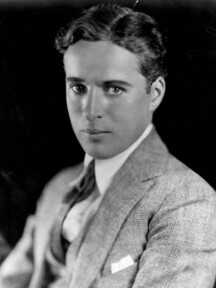On the halls – Ian Christie in TlS:
‘David Crump’s Fred Karno: The legend behind the laughter aims to strip away a century of misinformation and scandal, and restore its subject to his rightful place in entertainment history. Just why we might be expected to appreciate this labour of love is signposted on the cover. Charlie Chaplin is shown peering round one side of a portrait of Karno, which casts him as a pillar of the establishment, while Oliver Hardy gives Stan Laurel a leg-up. Mock-heroically, they signal what must be Karno’s lasting claim to fame – to have “discovered” both Chaplin and Laurel, and given them the early training in physical comedy that would underwrite their later success.’
(…)
‘The “halls” flourished, not only in London, but in every major city and town. Their steeply tiered auditoria and bars could accommodate audiences of all classes, from the “swells” promenading at lower levels to the masses cheering from the gallery. Among those who fondly recalled their youth in such places were Rudyard Kipling, Winston Churchill and T. S. Eliot, who wrote admiringly of one of the great stars, Marie Lloyd, at her death in 1922. Singers, dancers and acrobats were the halls’ main stock-in-trade, and it was as an acrobat that young Fred Westcott, a former plumber’s apprentice, made his debut in 1881. Performers’ lives were hard, and made more so by a vast railway network that allowed them to travel to widely separated bookings. Fred’s wife, Edith, also a performer, owed the loss of two babies in succession to her punishing schedule.’
(…)
‘It was in this role that Chaplin first emerged as a star, heading up one of Karno’s North American tours in 1910, with the sketch renamed A Night in an English Music Hall. One sweet irony of history is that it was the future Stan Laurel, also a Karno graduate, who played the “swell” before Chaplin. A decade later Stan briefly scratched a living on the vaudeville circuit as a Chaplin imitator, after Charlie’s film career took off in 1914 (and four years before his own began).’
(…)
‘Both Chaplin and Laurel, as their careers prospered, maintained that Karno had taught them most of what they knew about comedy. Above all, said Laurel, “he taught us to be precise”.
His protégés prospered in the new world that US-dominated cinema opened up, but Karno had little luck with it himself. Before the First World War he’d invested heavily and unwisely in a pleasure garden on Tagg’s Island that drained his resources. His sporadic attempts to break into film in Britain during the 1920s came to nothing, and weren’t helped by the depressed state of the local industry. Then, in 1929, the William Morris Agency asked him to contribute to a production by its new sensation, the Marx Brothers.’
(…)
‘This fascinating book presents a great deal of new research, much of it culled from the local and ephemeral press. One of his aims is to rescue his subject’s reputation from the opprobrium cast by a 1971 biography by J. P. Gallagher, and this he does persuasively, clearing Karno of charges of cruelty to his first wife, Edith, and of more general familial neglect. Equally important, however, is David Crump’s evocation of the vanished world of music hall, which was to have such an influence on the early years of cinema. It could even be argued (though the author doesn’t press the point) that without the popularity of “silent pantomime”, film would not have made its global mark. But to say as much is again to cast Karno in a supporting role. Whereas the halls, as long as they lasted, were of primary cultural importance, for it was in them, as Eliot put it, that working-class audiences found “the artistic expression and dignity of their own lives”.’
Read the article here.
Chaplin is definitely one of my heroes, bit I’d never heard of Fred Karno, let alone that he should be cleared of the charges that he was cruel to his first wife.
Silent pantomime and physical comedy as the enablers of the worldwide success of cinema, that is a soothing thought.
The disappearance of physical comedy has also to do with the disappearance of the proletariat and the assembly line work. What replaced the assembly line was the office.
